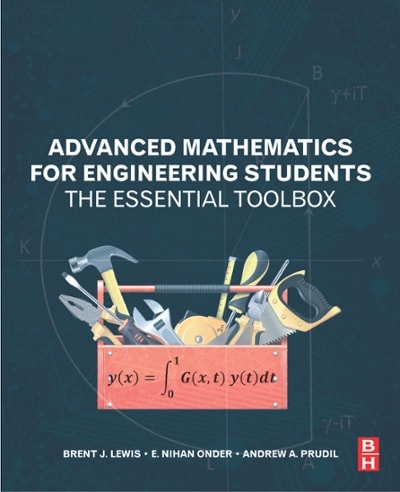A standard model for describing the dispersion of chemical pollutants in the atmosphere is the Gaussian plume
Question:
A standard model for describing the dispersion of chemical pollutants in the atmosphere is the Gaussian plume model. In this model it is assumed that the wind carries the pollutant in the \(x\) direction with an average wind speed \(u\), while the material diffuses in the other directions. In the case of a plane source of pollutant at \(x=0\), assuming only diffusion in the \(y\) direction (with a diffusivity \(D\) ), the steady-state transport equation for the concentration \(C\) is \(u \frac{\partial C}{\partial x}=D \frac{\partial^{2} C}{\partial y^{2}}\). Using the transformation \(\tau=x D / u\), this equation can be written as \(\frac{\partial C}{\partial \tau}=\frac{\partial^{2} C}{\partial y^{2}}\), subject to the conditions
\[
\begin{aligned}
& C=S \delta(y),-\infty
& C=0, y= \pm \infty, \tau>0 .
\end{aligned}
\]
The condition at \(\tau=0\) accounts for the plane source \(S\) of material being released into the atmosphere (that is, at \(x=\tau=0\) ). Here \(\delta(y)\) is a so-called distribution function which has the property that \(\int_{-\infty}^{\infty} \delta(y-a) f(y) d y=f(a)\) and \(\int_{-\infty}^{\infty} S \delta(y) d y=S\).
(a) Using a Fourier cosine transform method such that \(\hat{C}_{c}(w, \tau)=\mathscr{F}_{c}\{C(y, \tau)\}\), show that the transformed partial differential equation is
\[
\frac{\partial \hat{C}_{c}(w, \tau)}{\partial \tau}=-w^{2} \hat{C}_{c}(w, \tau)-\left.\sqrt{\frac{2}{\pi}} \frac{\partial C}{\partial y}ight|_{y=0} .
\]
(b) Using the given conditions and the property of the distribution function, show that the transformed solution in part (a) is \(\hat{C}(w, \tau)=\frac{S}{\sqrt{2 \pi}} e^{-w^{2} \tau}\).
(c) Taking the inverse Fourier cosine transform of the expression in part (b), show that the final solution is given by \(C(y, \tau)=\frac{S}{\sqrt{4 \pi \tau}} e^{-y^{2} /(4 \tau)}\). Why is the method of separation of variables inappropriate for this problem?
Step by Step Answer:

Advanced Mathematics For Engineering Students The Essential Toolbox
ISBN: 9780128236826
1st Edition
Authors: Brent J Lewis, Nihan Onder, E Nihan Onder, Andrew Prudil





